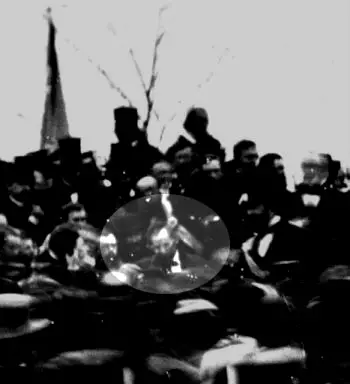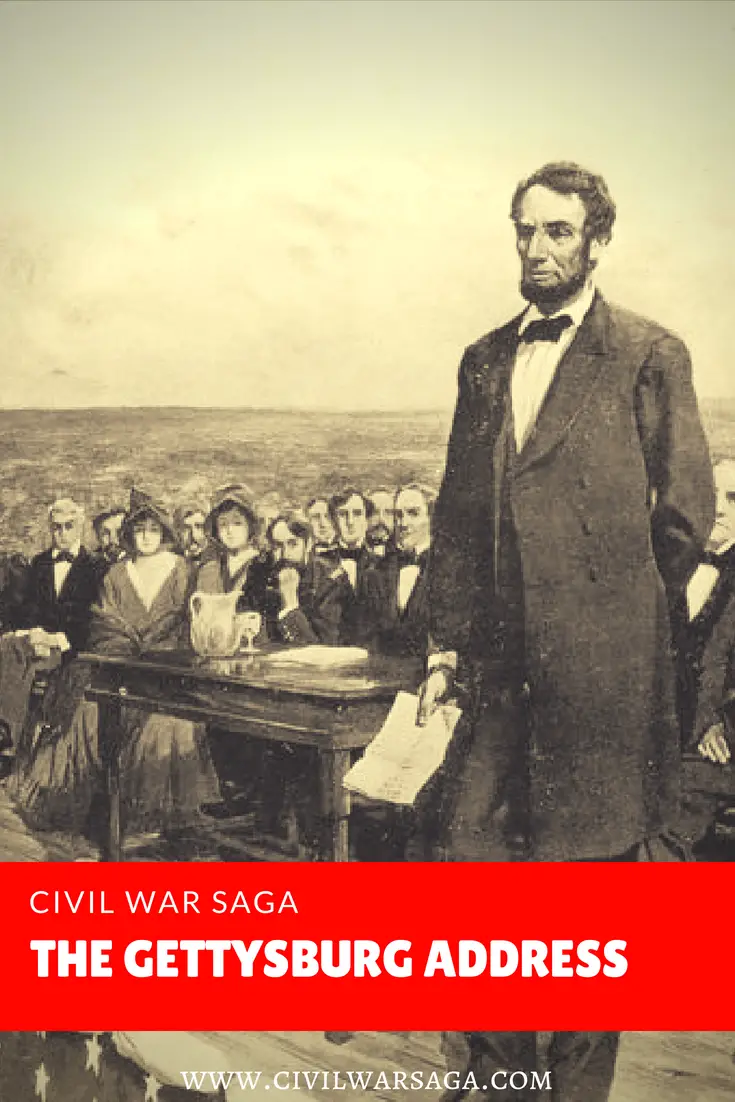The Gettysburg address is considered one of Abraham Lincoln‘s greatest speeches. The speech was given at a dedication ceremony for a cemetery of Union soldiers, known as the Soldier’s National Cemetery, in Gettysburg, Pennsylvania.
More than 50,000 soldiers died at the Battle of Gettysburg in July of 1863. Many states in the Union wanted to bring their dead soldiers home to be buried in churchyards and family plots in their hometowns. The governor of Pennsylvania at the time, Andrew Gregg Curtin, forbid it due to fears that it would spread disease.

Illustration of Abraham Lincoln giving the Gettysburg Address
As a result, a collection was taken up to raise money for a cemetery for the Union soldiers. Governor Curtin invited a famous orator of the time, Edward Everett, to give the opening speech at the dedication ceremony, on November 19, and also invited Abraham Lincoln to give a few “remarks” at the ceremony as well.
Lincoln was very busy at the time and barely had enough time to write his now famous speech. The day before the ceremony, Lincoln had only written half of it and various sources say he worked on it during the four hour train ride to Pennsylvania that day.
Yet, Lincoln’s private secretary, John Nicolay, said this was not true and that Lincoln wrote nothing during the train ride and instead relaxed and chatted with his fellow passengers.
At the ceremony the next day, nine thousand people showed up witness the dedication of the cemetery. Everett spoke first and went on for nearly two hours before Lincoln was given a chance to speak, according to the book Team of Rivals: The Political Genius of Abraham Lincoln by Doris Kearns Goodwin:
“An audience of nine thousand stretched away from the platform in a half-circle. Lincoln was seated in the front row between Everett and Seward. For two hours, Everett delivered his memorized address, superbly recounting various battles that had taken place over the three dramatic days. Lincoln reportedly ‘leaned from one side to the other and crossed his legs, turning his eyes full on the speaker. Somewhat later he again shifted his position and rested his chin in the palm of his right hand.’ Another member of the audience remembered Lincoln removing his speech and glancing over it before returning it to his pocket.”
Although Lincoln felt ill the day of the ceremony, he went ahead with his speech. The speech lasted only three minutes and consisted of only 272 words but the audience broke into applause five times as he spoke.
During his speech, Lincoln praised the men who had died on the battlefield and declared that they died preserving every American’s right to freedom and equality.
The speech echoed the ideals the country had fought for during the Revolution and reminded people why saving the union was important.

Only known photo of Abraham Lincoln at Gettysburg
Lincoln did not think the speech was a success at first. It wasn’t until the next day when Edward Everett sent Lincoln a note praising his speech, writing “Permit me…to express my great admiration of the thoughts expressed by you, with such eloquent simplicity & appropriateness, at the consecration of the cemetery” and some newspaper wrote several glowing accounts of the speech, such as the Chicago Tribune’s comment: “The dedicatory remarks by President Lincoln will live among the annals of the war,” that Lincoln was reassured it was well received.
Not everyone was impressed by the speech though. Several newspapers criticized it, according to the book A. Lincoln by Ronald C. White:
“Criticism from Lincoln’s political opponents in the press was instant. The Chicago Times responded, ‘The cheek of every American must tingle with shame as he reads the filly, flat, and dishwatery utterances of a man who has to be pointed out to intelligent foreigners as the President of the United States.’ Thirty-six miles from Gettysburg, the Harrisburg Patriot and Union spoke acrimoniously, ‘ We pass over the silly remarks of the President; for the credit of the nation, we are willing that the veil of the oblivion shall be dropped over them and that they shall no more be repeated or thought of. Far away, the Times of London, which did not like much that was American, did not appreciate Lincoln’s American eloquence either. The Times editorialized, ‘The ceremony was rendered ludicrous by some of the sallies of that poor President Lincoln.'”
In fact, the Times of London often sided with the Confederates on most issues during the early years of the war,
Unlike modern day presidents, Abraham Lincoln wrote his speeches himself and is the sole author of the Gettysburg address. Lincoln occasionally took writing advice from his colleagues but relied mostly on his own writing skills.
Despite the fact that Lincoln’s own parents were illiterate and he himself lacked a formal education, it is remarkable that he became such a gifted writer. Lincoln is often praised by modern day presidential speech writers, such as Kennedy speech writer Ted Sorensen, for his skill and eloquence.
Lincoln wrote out two copies of the speech by hand and gave them to his private secretaries, John Nicolay and John Hay. Lincoln later wrote three more copies and gave them to Edward Everett, George Bancroft and Bancroft’s stepson Colonel Alexander Bliss.
These copies are now in the hands of the Library of Congress, the White House, The Illinois State Historical Library and Cornell University.
Sources:
A. Lincoln by Ronald C. White
Team of Rivals: The Political Genius of Abraham Lincoln by Doris Kearns Goodwin
The Gettysburg Address; Abraham Lincoln; Michael McCurdy
The Library of Congress: Gettysburg Address: www.loc.gov/rr/program/bib/ourdocs/Gettysburg.html
The Library of Congress: The Gettysburg Address: myloc.gov/exhibitions/gettysburgaddress/Pages/default.aspx
New York Times: Gettysburg Address: topics.nytimes.com/top/reference/timestopics/subjects/c/civil_war_us_/gettysburg_address/index.html
Smithsonian Magazine; Ted Sorensen on Abraham Lincoln: A Man of His Words; Theodore C Sorensen; October 2008: http://www.smithsonianmag.com/history-archaeology/man-of-his-words.html
National Park Service: Reactions to the Gettysburg Address: www.nps.gov/gett/forteachers/upload/8%20Civilians%20on%20Address.pdf

